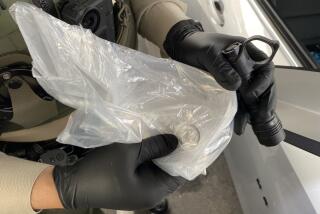L.A. Auto Show: Car whisperer apps liberate data from vehicles
- Share via
The brilliant brains of many new cars can share their secrets through the Internet, allowing car owners to be alerted through their smartphones about when exactly to fill up with gas, what might be causing that funky engine noise and when their children are taking out the family car for joy rides.
Now, several companies are trying to give owners of many older cars the same ability to constantly and wirelessly access the knowledge hidden in on-board diagnostics units. The companies are building gadgets somewhere in between a Fitbit-like health monitor, a motion sensor and Google Chromecast.
“These after-market guys are providing a reasonably priced do-it-yourself solution that are harnessing the power of smartphones,” said Praveen Chandrasekar, a telematics analyst with the consulting firm Frost & Sullivan. “If you look at the millions of the cars on the road in America, it’s a huge opportunity for explosion.”
PHOTOS: L.A. Auto Show model debuts
The devices plug into a port below the steering wheel in most cars, read complicated codes in the vehicle’s computer and one way or another wirelessly pass them onto the Internet via a cellphone network signal. Once online, the data are crunched by apps that display information that companies hope provide convenience or savings to drivers.
Last month, Apple gave a boost to the industry when the iPhone-maker announced that its always-buzzing stores would start selling one of the devices -- Automatic Link. At the Los Angeles Auto Show this week, Verizon and Sprint are showcasing similar technology that they sell primarily to businesses. And Audiovox is displaying a competitor sold at Sears stores.
FULL COVERAGE: L.A. Auto Show 2013
But each of the devices and the growing number of connected cars that have begun rolling out are raising concerns about the online storage, usage and sharing of the data that was once rarely seen by anyone besides auto shop mechanics.
San Francisco start-up Automatic has garnered praise because its device sells for $99.95 with no subscription fees, unlike many other options (the price in March was $69.95). Among other things, the iPhone app promises to tell drivers about whether they hit the brake or accelerator pads too hard and how much time they spend speeding. It also logs trip histories, and a feature being tested would automatically alert authorities in the event of a crash.
Automatic has promised the feedback will become more valuable as the user base grows because then drivers of like-cars can be compared. An Android-compatible device is expected in December.
In step with most tech companies, Automatic states clearly that it will share the data with others if required to do so by law. Most dicey is the location data collected by these apps, Chandrasekar said. Ultimately, consumers opt in to use these devices, and the companies have an interest in keeping users happy by keeping the data safe.
Car makers and insurance companies are among those who crave the data collected by vehicles and the gadgets attached to them. That’s why the consulting firm IHS said this week that the value of data inside vehicles will be $14.5 billion by 2020.
Car companies see an opportunity to spot manufacturing defects before they become widespread, giving them a chance to keep down warranty reserves, according to IHS automotive senior analyst Mark Boyadjis. Insurance companies such as State Farm and AAA give out devices to customers willing to have their driving monitored in exchange for potentially lower premiums if the data show they are safe drivers.
The State Farm device comes from a partnership with Verizon’s telematics, or remote tracking, unit. Verizon through auto parts manufacturer Delphi also sells devices direct to consumers through its website. The Delphi Connect is $99.99 with a $5 monthly fee. For twice the price along with a $5 monthly fee and a separate mobile data plan, the device can turn the car into a Wi-Fi hotspot through Verizon’s 4G LTE network.
Wireless service competitor Sprint is marketing a device primarily to companies with a large amount of cars, such as rental companies, and car manufacturers, such as Chrysler.
“Imagine matching the settings of your regular Chrysler into your rental vehicle,” said Ben Voss, Sprint’s vice president of emerging solutions. “There’s a play for direct to consumers, but it has to recognize some real value proposition first.”
Rather than simply be the pipe that’s transferring data, Sprint wants to provide a suite of services inside the car and on mobile apps. One scenario would be customized gas deals when a vehicle is low on fuel. Same goes for a company such as Autonet, which is considering a device to sell direct to consumers but for now is focusing on connecting new cars to the Web.
Audiovox’s Car Connection works with Sprint’s and AT&T’s networks. One of the $152.99-device’s features is a parental control alert that notifies parents when a car leaves a defined geographic area.
Meanwhile, Lemur Vehicle Monitors, Carvoyant, Kiwi 2, Mojio, Mavia and DASH all have released or plan to release OBD-II devices.
Devices that read the information passed through the car’s technically named OBD-II port have been around for years. But older devices such as CarMD required plugging the device into the computer, and it’s the tech generation that’s brought the new wave of “always-on” products.
“It’s a cost-effective strategy that’s being tried out,” Chandrasekar said.







